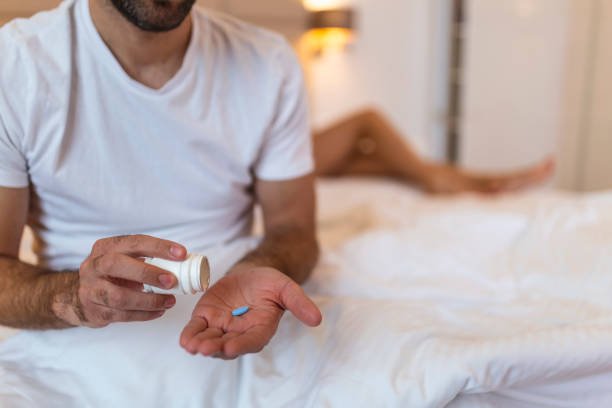
Does High Blood Pressure Cause Impotence? High Blood Pressure and Antihypertensive Drugs May Cause Erectile Dysfunction
Erectile Dysfunction (ED), commonly known as impotence or infertility, refers to the inability to maintain an erection to satisfy sexual function for a long time. Due to the low proportion of patients seeking medical assistance, it is impossible to accurately estimate the incidence of this symptom, but according to estimates , about 8% to 10% of the male population aged 18 to 60 have this problem. Although this is not a life-threatening disease, it will have a serious impact on men’s lives.
Compared with the general population, patients with high blood pressure (Hypertension) are more likely to have sexual dysfunction. At the same time, studies have shown that high blood pressure and some antihypertensive drugs can have adverse effects on erections. If we want to explore the reasons, let us first start with Let’s start with the principle of erection.
Why do you get an erection?
Penile erection is a physiological reaction resulting from the interaction of nerves, blood vessels, hormones and psychological factors. From an anatomical point of view, the main body of the penis is the corpus cavernosum. The left and right sinus-shaped cavernous bodies extend from the penis to the pelvis. In the corpus cavernosum, There are blood vessels, smooth muscles and dense small spaces.
Under normal circumstances, in order to maintain tissue needs, only part of the arteries supplying blood to the penis will flow. When sexual desire is stimulated through physical or psychological stimulation, the brain will send signals to trigger a hormonal response, causing the penile arteries to expand and more blood to flow. thus flowing into the corpus cavernosum.
Because blood enters the corpus cavernosum faster than the veins can flow out, and the veins are compressed, blood is retained in the penis. This reaction is beneficial to achieving and maintaining an erection. When the brain stops sending arousal signals, the hormonal response ends, arterial blood flow returns to normal, and the penis returns to its flaccid state.
How does high blood pressure affect erectile function?
In addition to physiological mechanisms, arterial dilation generally involves biochemical reactions of cells. Therefore, the key elements of erection are normal vascular endothelial cells and nitric oxide; nitric oxide produced by endothelial cells can help regulate blood vessel elasticity (dilation or contraction of blood vessels) , if you have high blood pressure, physiological changes may occur in the blood vessels; elevated blood pressure will cause small tears in the blood vessel wall. During the repair process, the blood vessel wall will thicken and become narrow, which may form atherosclerosis. Atherosclerosis, which not only affects the coronary arteries of the heart, but also the blood vessels of the penis may harden, reducing blood flow to the penis, which may lead to erectile dysfunction.
In addition, high blood pressure is also one of the reasons for the decrease in nitric oxide content. Nitric oxide can relax and dilate blood vessels. As time goes by, the amount of nitric oxide synthesized and released by patients with long-term hypertension may decrease, thus affecting the adequacy of blood vessels. The ability to expand prevents the normal delivery of extra blood needed for engorgement of the penis, leading to impotence.
In addition, men with high blood pressure may also have lower testosterone
(Testosterone) concentration, testosterone is the main male hormone and plays an important role in sexual desire. If the testosterone level is too low, it will cause the hormone’s response to sexual desire to decrease.
The relationship between blood pressure-lowering drugs and erectile dysfunction
In addition to high blood pressure, which may cause impotence, taking antihypertensive drugs may also cause sexual dysfunction. Among many high blood pressure drugs, diuretics and β-blockers have the greatest impact on penile erection. obvious.
- Diuretics:
may reduce blood flow into the penis, leading to erectile dysfunction. In addition, diuretics may also reduce the content of zinc (Zinc) in the body. Zinc is an important raw material for the production of testosterone. Fortunately, diuretics bring The side effects will stop after stopping the medication. - Beta-blockers:
This drug interferes with the nerve impulses that cause erectile responses, causing the corpus cavernosum of the penis to be less soft, making it harder for the penile arteries to expand and blood to flow in. In addition, beta-blockers may also cause mild sedation or depression, reduce sexual desire, and thus lead to sexual dysfunction.
In addition, since men’s psychological state, such as tension and anxiety, can also affect erectile function, impotence can also be caused by personal psychological factors in patients with hypertension. A study shows that patients who clearly understand the side effects of medications are more likely to have sexual dysfunction than those who do not fully understand. Therefore, patients’ knowledge of their health status, medications, and psychological adjustment may have an impact on the relationship between bed and bed. Different effects.

In summary, erectile dysfunction in patients with high blood pressure may be caused by blood vessel changes, drug side effects, or may be related to stress and depression. If you have high blood pressure and erectile dysfunction, don’t be too panicked. , you might as well have a good chat with your doctor to improve your symptoms.
The necessity of taking high blood pressure medication
Some patients with high blood pressure worry that taking high blood pressure medicine will cause impotence, and even refuse to take the medicine, but now you know that high blood pressure may also cause sexual dysfunction and lead to heart disease. A better way is to first discuss with your doctor whether you can consider using hypertension drugs other than diuretics and beta-blockers to reduce the impact on penile erectile function. However, the doctor’s professional judgment should still be used.
If you are already taking high blood pressure medication, please do not stop taking it because you are worried about side effects or because you feel your high blood pressure has improved. This will often make your blood pressure fluctuate even more, resulting in a rebound in blood pressure, which will in turn cause greater damage to your blood vessels.

How to treat sexual dysfunction caused by high blood pressure
In clinical treatment, the most commonly used drug is phosphodiesterase type 5 inhibitor (PDE5 inhibitor). In fact, the well-known “Weil Steel” is a type of PDE5 inhibitor. However, please consult your doctor before taking medication, because some antihypertensive drugs, such as nitrates or α-blockers, can cause excessive vasodilation when used together with PDE5 inhibitors, which may Cause hypotension or other related symptoms.












